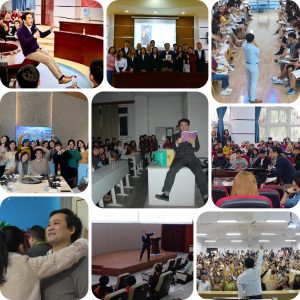 欧州講演を前に②中国全土にて
欧州講演を前に②中国全土にて
最初の10年は、大学のキャンパス外に出るのは稀で、同じ場所から動かない生活をしていました。日本では石の上にも三年と言いますが、中国では、舞台で1分間の芸を見せるのに、10年間下積みをすると言われます。それで、とりあえず、10年下積みをしました。
ひと言、10年と言っても、簡単ではありません。学生たちのアクセントを直す時は、時計をチラ見して、「まだ、2分しか経っていないか……」「やっと10分経ったか……」というのを、毎日放課後、8時間やりました。スピーチ指導は時間が過ぎるのが早かったので、ずっとラクに感じました。「そんなにたくさんのアドバイスやフィードバック、よく思いつきますね」と言われましたが、発音矯正と比べたらずっとラクだったので、せめて真剣に聞いて、できるだけ内容を覚え、できるだけ建設的なアドバイスを送ろうと思っていました。
そんな10年を送った自分がスピーチをすれば、うまくできるだろうと自分を信じて『日本語講演マラソン』を始めました。しかし、自分が舞台に立つとなると、なにもかもが、想像していたものと違っていました。そういえば、学生のスピーチは、3分間か5分間、自分のスピーチは、120分間だったのです。
講演中、聞いている学生たちの顔を見ると、たった数十秒うまく話せなかっただけで、すぐに退屈そうな顔をし出します。一度切れた集中力を元に戻すのは容易なことではないので、全員立ち上がって、目の体操をしたり、その場で1分間ジャンプをしたりして、よどんだ空気を追い払いました。私は講演中も授業中もしょっちゅう拍手をしますが、あれは神社の二礼二拍手一礼と同じで、邪気払いです。講演活動は、まさに自転車操業で、長らく続けていくうちに、辛さにも慣れ、「ああ、人生はこれで良いのだ」と思うようになりました。
次の10年は、胸焼けするほど大きな声で講演し続ける日々。ある日、夜行バスで朝6時に大学正門前に着くと、先生も学生も全員待っていてくれて、主任の先生が「じゃあ、いまから講演やりましょうか」とおっしゃり、早朝6時半から大声を張り上げました。たまには、珍しい外国人というだけで、街の人気者にもヒーローにもなることがありました。
またある日、500人の会場いっぱいに学生が集まってくれた夜の講演。いきなり停電になりました。普段から「自分はハプニングに強い。逆境になればなるほど強くなる」と言い聞かせていましたが、さすがにマイクが使えず、途方に暮れていたところ、ある学生がスマホを取り出し、ライトをこちらに向けました。その時、思いつきで、「ラーラーララーラーラ」と、SMAPの『世界に一つだけの花』を歌い出すと、みんなも続いてくれました。歌詞は覚えていなかったので、しばらく「ラーラーララーラ」とだけ歌っていたら、突然照明もマイクもつき、電気が戻りました。会場に、大きな笑い声が響きましたが、暗闇の中、全員スマホを取り出し、左右に手を大きく振りながら、大合唱をしたときの美しさ、あの感動は忘れられません。
またある時、講演会の質疑応答タイムで学生に「先生は、唐詩三百首(百人一首みたいなもの)の中でどれが好きですか?」といきなり聞かれ、パニクッてしまったことがあります。なにも答えられず、ゆっくり歩き出し、七歩目で立ち止まると、会場から笑いが起きました。そこで、三国時代の曹操の子ども、兄の曹丕から、七歩進むうちに詩を作らねば殺すぞと脅かされて作った弟・曹植の詩の最初の句(豆を煮て以てあつものとなし)を中国語で唱えると、拍手と笑い声の中、全員で七歩詩を大合唱しました。
講演会では、数知れずやらかしてしまいましたが、たまには、人に話せるタイムリーヒットを打つこともできました。
(次回は欧州・アフリカ編)
もちろんです!以下の文は、初級英語学習者でも理解しやすいように簡単にしました。
Before the European Lectures
Part ②: Across China
For the first 10 years, I rarely left the university campus and stayed in one place. In Japan, there’s a saying, “Three years on a rock.” But in China, they say it takes 10 years of practice to perform for one minute on stage. So, I spent 10 years practicing.
When I say 10 years, it wasn’t easy. For example, when I helped students fix their accents, I would check the clock, thinking, “Only two minutes have passed…,” “Finally, ten minutes…” I did this for eight hours every day after school. Speech coaching felt easier because time went by faster. People would say, “How can you give so much advice and feedback?” But compared to correcting pronunciation, speech coaching was much easier. So I listened carefully and tried to give helpful advice.
After doing this for 10 years, I thought I could give good speeches too. So, I started the "Japanese Lecture Marathon." But once I was on stage, everything felt different. Student speeches were only 3 to 5 minutes long, but my speech was 120 minutes!
During the lecture, I noticed that if I didn’t speak well for just a few seconds, the students would look bored. It’s hard to get their attention back once it’s lost, so I had everyone stand up, do eye exercises, and jump for one minute. I often clap during my lectures and classes—it’s like the two claps and bow at a shrine to chase away bad energy. After doing lectures for a long time, I got used to the difficulty and began to think, “This is how life is.”
In the next 10 years, I gave even louder lectures. One day, I arrived at the university gate at 6 a.m. by night bus. The teacher and students were already there waiting for me. The head teacher said, “Let’s start the lecture now,” so I began shouting at 6:30 in the morning. Sometimes, just being a foreigner made me a local hero.
On another day, I gave a lecture to 500 students at night. Suddenly, the power went out. I always tell myself, “I’m strong when things go wrong,” but without a microphone, I was stuck. Then, a student turned on their phone light and pointed it at me. I started singing SMAP's "Sekai ni Hitotsu Dake no Hana" with “La-la-la,” and the students joined in. I didn’t remember the lyrics, so we kept singing “La-la-la” until the lights and microphone came back. Everyone laughed, but I will never forget how beautiful it was when we all waved our phones and sang together.
Another time, during the Q&A session of a lecture, a student asked me, “What is your favorite poem from the ‘Three Hundred Tang Poems’ (which is like Japan’s Hyakunin Isshu)?” I panicked and couldn’t answer. I walked slowly, and by the seventh step, the audience laughed. I remembered a poem by Cao Zhi from the Three Kingdoms period. He was forced to make a poem in seven steps or be killed. I recited the first line of his poem in Chinese, and the whole room clapped and laughed. Then we all sang the poem together.
I’ve made many mistakes during my lectures, but sometimes, I’ve hit the mark and had memorable moments.
(Next time: Europe and Africa)